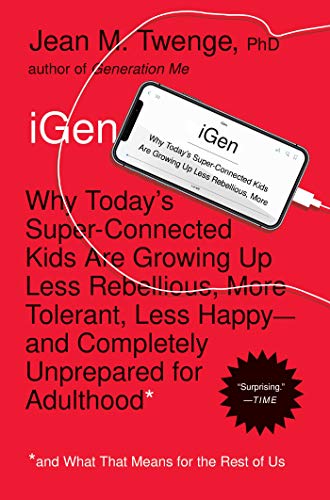Jean M. Twenge – iGen Audiobook
Jean M. Twenge – iGen Audiobook

If you read this testimonial, according to the cornucopia of study offered in this book, you are unlikely to be an iGen’ emergency room. “By 2015, one out of three secondary school elders confessed they had not read any books for pleasure in the past year, 3 times as lots of as in 1976.” While Professor Twenge cautions us not to assess some of her findings as good or negative, this, for me, is surely a bit unfortunate.
As a sexagenarian father of two daughters, aged 14 and also 16, I desperately needed and wanted to read this book. As well as I had not been let down. It is well written and offers a wide range of info as well as insight. Much of it, I located, reinforced my own observations of my children. Sometimes, that permitted me to breathe a sigh of alleviation. At least, their behaviors that are the most various from my very own at their age are not special to them.
Twenge bewares in advance to verbalize the limitations of this type of analytical analysis. “Due to the fact that the study examples are across the country representative, they stand for American young people as entire, not simply an isolated team.” iGen Audiobook Free. That larger group, the iGen’ ers, are specified as those born from 1995 to 2012, a group of 74 million Americans that presently account for 24% of the population.
Among the things I usually find limiting in this kind of big information analytical evaluation is that it chronicles attributes. Yet if an image deserves a thousand words, a behavior deserves 10 thousand images, and Professor Twenge plainly appreciates that. She doesn’t simply provide the data, she probes it.
A few arbitrary thoughts struck me as I review it.
I matured at the elevation of the Vietnam War. When I was required to register with Selective Service, the draft was still in place as well as university deferments, for good reason, had been eliminated. I vividly remember standing in my senior high school lunchroom at the age of 17 paying attention to the statewide news of our lotto draft numbers. The numbers were attracted by birth date as well as the official checking out the numbers began the program keeping in mind that the initial 123 numbers attracted were almost specific to be composed, the second 123 numbers might or might not be depending upon need, and also the last 119 might rest easier. My birthday was drawn 124th. The birthday celebration of my friend, who took place to be standing alongside me, was drawn 3rd.
I supply that only to recommend that there are certain historical events that aid to specify individuals, otherwise a generation. The danger of being sent to combat in the forest of Southeast Asia was one for me. That’s not to claim that iGen’ ers have actually not endured such historic events. It’s simply to advise us that they exist.
The other observation that I had, which isn’t directly checked out in guide, is the change not just in how we live, yet where we live. I walked to institution on my own starting in the 4th grade, roadway my bike all over, as well as invested nearly all of my waking hours with buddies– with no grown-up guidance. Individuals really did not reside in sub-divisions a lot in those days. We lived in financially varied communities. Uncontrolled development as well as the socio-economic homogeneity of the suburban neighborhood have both encouraged and demanded particular modifications in how our kids live. Jean M. Twenge – iGen Audio Book Online. My final monitoring involves the individualistic versus cumulative social norm. Teacher Twenge writes, “… cultural individuality is attached to slower developing rates across both countries and also time. Worldwide, young people grow up more gradually in individualistic countries than collectivist ones.”
My family members stayed in China for 9 years. For my children, it was during the duration from age 5 up until age 14, generally. China has a collective society in the severe and it was my monitoring that the kids grew really gradually, at least contrasted to my individual experience as a Boomer. (I learnt from this publication that this is an international growth.) Due to the collectivist society, nonetheless, my other half and also I were very tolerant with the self-reliance we permitted out little girls. At a dining establishment, as an example, we never ever hesitated to allow the youngsters go off and also use their own, out of our view. (A youngsters’s play area is used at basically every dining establishment.) Violent criminal offense and assaults on youngsters are rare in China, but much more significantly, we knew that everyone else at the restaurant, including the personnel, would keep a close eye on the safety and security of the children. It’s just part of the collectivist way of thinking. They all really feel responsible. My factor being that I’m uncertain the individualistic versus collectivist measurement isn’t a little bit counter-intuitive when you get to the social extremes.